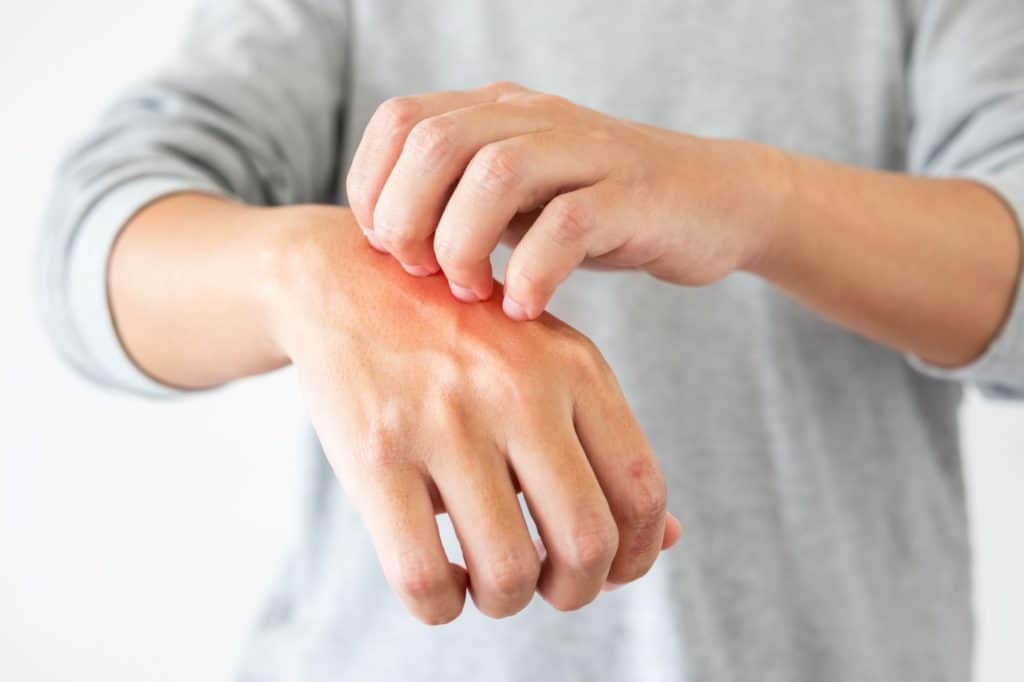What causes histamine intolerance? Do you suspect you’re sensitive to histamine, or have you been diagnosed with this misunderstood condition? It’s frustrating when you can’t get answers!
Having seen many patients suffering from allergy-like symptoms who benefit from a low-histamine diet and lifestyle, this condition deserves more attention.
The goal of this blog is to help you understand and heal from histamine intolerance.
This involves a change in diet and lifestyle, but first, you must be aware of what causes histamine intolerance and its diverse symptoms, so you can make changes that will reduce the symptoms.
How Many People Have Histamine Intolerance?
Histamine intolerance is a common problem in the United States and develops due to too much histamine in the body.
According to the American Journal of Clinical Nutrition, around 1% of the population has histamine intolerance, also known as histamine sensitivity. (2) However, experts believe cases are under-diagnosed and under-reported.
Having high levels of histamine in your body can cause unpleasant symptoms, many of which mimic an allergic reaction.
Some people who have it are convinced they’re allergic to something or have a food intolerance, but can’t figure out what it is. Others know something is wrong and have no idea what or why.
What causes histamine intolerance? Many people see their doctors and get allergy tested, only to discover that no allergy shows up.
To make matters worse, doctors are not well versed in histamine intolerance and may scratch their heads when you tell them about your perplexing symptoms and have little to offer.
What Causes Histamine Intolerance?
What is this strange entity called histamine intolerance, also known as histamine sensitivity? Normally, your body breaks down histamine when too much builds up, so it stays in a healthy balance (1). Histamine, when it’s balanced, is beneficial to the human body.
When white blood cells, including eosinophils and basophils, encounter something, like a foreign protein or a virus they’re trying to protect you against, they release histamine. This is a signal that recruits other immune cells to the area.
Histamine is a biogenic amine, a chemical that causes inflammation. If you have a foreign invader in your body, like a virus, histamine alerts your immune system so they can “send in the troops” to fight the invader. (3) Hopefully, they vanquish the intruder if there is one and the threat is averted.
You also release histamine when your body reacts to something you’re allergic to. When eosinophils and basophils release histamine, it widens your blood vessels, so protective immune cells can reach the site where the threat is.
How Histamine Intolerance Affects the Immune System and Other Organs
Immune cells produce histamine, but your brain is one organ in your body that uses it. Inside the dark recesses of your brain are neurotransmitters, brain chemicals that send messages between parts of your brain and to your body.
Some you’re probably familiar with are serotonin, a neurotransmitter that affects mood, appetite, and cognitive function, and dopamine, a neurotransmitter that plays a key role in movement. Histamine activates these neurotransmitters in the brain and helps them work better. (6)
Histamine plays a role in brain health too, by helping you stay alert. But if you have too much of it, because of histamine intolerance, it can cause your brain to feel overstimulated. (4)
That’s why you might experience anxiety or even panic attacks if you have histamine intolerance. How many people with chronic anxiety and other mental health issues actually suffer from undiagnosed sensitivity?
If you have too much histamine in your system, it can affect various organs, since many organs have histamine receptors. Your heart and brain are obviously highly sensitive to histamine.
It can also impact your lungs, eyes, skin, and digestive system. Histamine plays a key role in digestion too by stimulating the release of gastric acid that helps you digest your food. (5)

The Symptoms of Histamine Intolerance
Experts who treat high histamine levels say it’s more common than people realize. Most people who suffer from it know something isn’t right, but they can’t explain it and often their doctors can’t either. They just know they have a number of symptoms they can’t explain or shake.
To make it even more challenging, the symptoms vary from person to person. Some people experience sneezing, a stuffy nose, or digestive problems, while others complain mostly of anxiety and brain fog.
The symptoms of histamine intolerance are highly variable. Some people will only experience a few symptoms, while others have many symptoms affecting their respiratory system, brain, and digestive tract.
The digestive tract is a common target, since you have histamine receptors there. (8) If you have histamine intolerance, a common scenario is this.
You eat foods that release histamine or that interfere with its breakdown, and within a few hours, you develop diarrhea, lightheadedness, flushing, itching, headache, or a stuffy nose. It’s easy to see how doctors confuse histamine sensitivity or intolerance with classic allergies.
Sensitivity to Histamine Varies
The symptoms you get when you have too much histamine in your body depend on your sensitivity to histamine and how much histamine overload you have.
If you have little DAO and HNMT, the two enzymes that break down histamine, your body’s histamine levels will rise more than someone who has more DAO and HNTMT activity. (7)
There are various degrees of histamine intolerance as well as sensitivity to the effects of histamine.
The types of symptoms you have will also vary with the density of histamine receptors you have on various organs. For example, if you have a high density of histamine receptors in your brain, you might have more anxiety or brain fog.
But if you have a high density in your digestive tract, you might experience more nausea or diarrhea. That’s why people can have varying symptoms and still have histamine intolerance.
Histamine Breakdown – The Role of Two Key Enzymes
By now you’re probably asking the big question – what causes histamine sensitivity? You have two key enzymes in your digestive tract that break down histamine – diamine oxidase (DAO) and histamine-N-methyltransferase (HNMT). (7)
Histamine intolerance occurs when these enzymes don’t do their job as well as they should, and histamine doesn’t break down properly. Certain foods can interfere with the activity of these enzymes, particularly DAO.
Some people also don’t produce enough of these two enzymes to break down histamine fast enough. Plus, your digestive tract might release too much histamine when food enters your stomach, and then it sticks around too long.
Diet and Histamine Sensitivity
If you have histamine intolerance, you may not develop symptoms every time you eat; it depends on the composition of your meal.
If you eat a meal high in histamine or foods that block the activity of histamine breakdown enzymes like DAO, it triggers symptoms. If you don’t, it doesn’t. That’s why diet plays such an important role in treating this condition.
Some foods that can stimulate histamine release include chocolate, nuts, beans, lentils, tomatoes, and citrus fruits. We’ll go into more detail on specific foods and how they affect histamine intolerance in future articles.
Then there are foods that reduce the activity of enzymes that break down histamine – DAO and HNMT. Some of these include tea, both green and black, alcohol, energy drinks, and egg whites.
Some Foods Contain Preformed Histamine
Finally, there are foods that contain preformed histamine. Some of the biggest culprits are fermented and pickled foods, since bacteria involved in fermentation produce histamine. Canned foods are another common source of preformed histamine.
Other foods that contain histamine include certain spices, particularly cinnamon, alcohol, chocolate, and certain fruits, like strawberries and citrus fruits.
Even some vegetables contain histamine, including spinach, tomatoes, and eggplant. In fact, much of this blog will be devoted to discussing what to eat and not eat with histamine intolerance.

The Role Medications Play in Histamine Intolerance
Some medications can worsen histamine intolerance. Examples include certain medications used for treating heart disease, high blood pressure, and other conditions that contain a substance that promotes the release of histamines.
There are many types of drugs that release histamines into the body. An interesting one is the estrogen in birth control pills and hormone replacement therapy. Histamine intolerance is more common in women. One explanation is that women have higher levels of estrogen. (9)
Other common medications that can worsen histamine intolerance are non-steroidal anti-inflammatory medications and aspirin. These common non-prescription drugs reduce the activity of the DAO enzyme that breaks down histamine. (10)
Diagnosing and Treating Histamine Sensitivity
If you have symptoms, you hope there’s an easy test that will give you a diagnosis. Unfortunately, that’s not the case with histamine intolerance. Although you can measure the DAO enzyme that breaks down histamine and measure histamine levels, levels aren’t always correlated with symptoms.
However, it is important to rule out other health conditions that cause similar symptoms. One that’s important to rule out is mast cell disorders, since the symptoms of mast cell disorders and histamine intolerance are similar.
There also isn’t an approved medication for treating histamine sensitivity. However, dietary changes can have a big impact on symptoms.
In addition, there are supplements that benefit some people with histamine intolerance. The best approach is to switch to a low-histamine diet (more information to follow) and make other lifestyle changes, including habits that help you control stress.
Moderate exercise, good sleep habits, and stress relief techniques, like meditation, are helpful in many cases. There are also other ways to lower your histamine level.
Conclusion
Hopefully, you better understand what causes histamine intolerance and why it causes such a diverse array of symptoms. In future articles, we’ll delve into what you can do if you have it, including what foods to eat and which to avoid. Also, find out whether there are side effects of a low-histamine diet.
References:
- Maintz L, Novak N. Histamine and histamine intolerance. Am J Clin Nutr. 2007 May;85(5):1185-96. doi: 10.1093/ajcn/85.5.1185. PMID: 17490952.
- Laura Maintz, Natalija Novak, Histamine and histamine intolerance, The American Journal of Clinical Nutrition, Volume 85, Issue 5, May 2007, Pages 1185–1196, https://doi.org/10.1093/ajcn/85.5.1185.
- Jutel M, Blaser K, Akdis CA. The role of histamine in regulation of immune responses. Chem Immunol Allergy. 2006;91:174-87. doi: 10.1159/000090280. PMID: 16354958.
- Syst. Neurosci., 28 April 2014 | https://doi.org/10.3389/fnsys.2014.00064.
- Coruzzi G, Adami M, Pozzoli C. Role of histamine H4 receptors in the gastrointestinal tract. Front Biosci (Schol Ed). 2012 Jan 1;4:226-39. doi: 10.2741/264. PMID: 22202056.
- Flik G, Folgering JH, Cremers TI, Westerink BH, Dremencov E. Interaction Between Brain Histamine and Serotonin, Norepinephrine, and Dopamine Systems: In Vivo Microdialysis and Electrophysiology Study. J Mol Neurosci. 2015 Jun;56(2):320-8. doi: 10.1007/s12031-015-0536-3. Epub 2015 Mar 29. PMID: 25820671.
- “Histamine intolerance – Labor: IMD Institut für ….” https://www.imd-berlin.de/en/special-areas-of-competence/food-intolerances/histamine-intolerance.html.
- Deiteren A, De Man JG, Pelckmans PA, De Winter BY. Histamine H₄ receptors in the gastrointestinal tract. Br J Pharmacol. 2015;172(5):1165-1178. doi:10.1111/bph.12989.
- “Histamine Intolerance: A Common Cause of Chronic ….” 06 May. 2016, https://ndnr.com/autoimmuneallergy-medicine/histamine-intolerance-a-common-cause-of-chronic-complaints/.
- Maintz L, Novak N. Histamine and histamine intolerance. Am J Clin Nutr. 2007;85(5):1185-1196.

